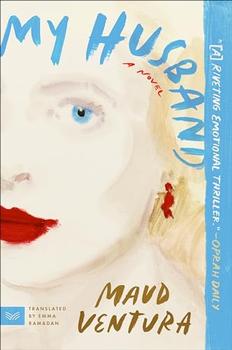Summary | Excerpt | Reviews | Beyond the Book | Readalikes | Genres & Themes | Author Bio

A Novel
by Maud Ventura, Emma Ramadan
He has always admired how rigorously I note the words I need for my translations in my small notebooks. I have a dozen of them. The red notebook is for terms related to politics and societal debates, the blue one is for terms related to nature and the environment. (That one's been written in the most; in particular it contains the names of climbing plants in English gardens and the different species of oak trees). They are all placed side by side on the shelf above my desk, but today I notice that one of them has disappeared. I look everywhere for my yellow notebook, which contains vocabulary related to medicine and the history of the sciences, in vain.
I also have a notebook dedicated to romantic vocabulary, with words that pertain to meeting someone, relationships, separations, and every variation of feeling. Certain recurring expressions give shape to the romantic imagination of the English language—and, by extension, to that of the Irish novelist. (There's no way to prove it, but it seems to me that she blames herself for the devastating loss of her first love, and believes she must pay the price of her past mistakes for her entire life.) For example, the phrase "let you go" is everywhere in her book. "Let you go" is in the mouth of every character and used in every situation: I shouldn't have let you go, I will never let you go, don't let me go, etc. The expression is often used as a form of regret: I'm angry at myself for having let you go, I should have made you stay. We think it's our fault if the other person leaves us, that we could have done something to stop it. We imagine that we could have acted in such a way as to preserve their desire to be together. The idea behind "let you go" is pleasant; there's even something reassuring about it. It's a fiction that I, too, would like to believe in. Absorbed in my translation, I wonder if that expression, so difficult to translate into French, testifies to the fact that English-speakers love differently than us. Do they make more effort? For them, is it possible to make love last? To reignite a desire that's been extinguished? How do they do it? What tender song, new outfit, irresistible perfume, or vacation to the other ends of the earth allows them to hold on to someone on the verge of leaving?
Will "let you go" one day seep into my marriage? How can we protect ourselves from this English blight? Unsurprisingly, even when focused on my translation work, I'm thinking about my husband with each page. All the books I read are about him. During my first translation on the Copernican Revolution (what a scandal: we are not the center of the world, the Earth revolves around the Sun, exiled in an infinite universe), I couldn't stop comparing that scientific discovery with my emotional life. I realized, overwhelmed, that this collapse of all previous points of reference, of everything that had been taken for granted, is exactly what it would feel like if I had to live without my husband. The narrative can unfurl in a distant epoch or in a remote universe: I will still be brought back to him through a description, a love scene, a word. A work on gardening or a book on ancient Egypt can still easily remind me of my husband.
*
I grab the largest book in our library, pulling the letter from between its pages and placing it on my desk. The envelope has not been opened; I check every Tuesday. In the last few months, I've hidden it in the dresser drawer, in a shoebox, in the wicker basket under my bedside table—but my husband has never found it.
The rain stops. It, too, has abandoned me. I make a cup of tea and sit in the living room armchair—in this spot at this time of day, the light is ideal for reading. I open The Lover, which I left out conspicuously on the coffee table. Will my husband notice it this time? Will he pick up on the clues I sprinkle in his path? Last night I was incapable of reading a single line, but this time I lose myself in the novel, which makes my afternoon go by more quickly, effortlessly consuming the remaining hours.
Excerpted from My Husband by Maud Ventura and Emma Ramadan. Copyright © 2023 by Maud Ventura and Emma Ramadan. Excerpted by permission of HarperVia. All rights reserved. No part of this excerpt may be reproduced or reprinted without permission in writing from the publisher.
Your guide toexceptional books
BookBrowse seeks out and recommends the best in contemporary fiction and nonfiction—books that not only engage and entertain but also deepen our understanding of ourselves and the world around us.